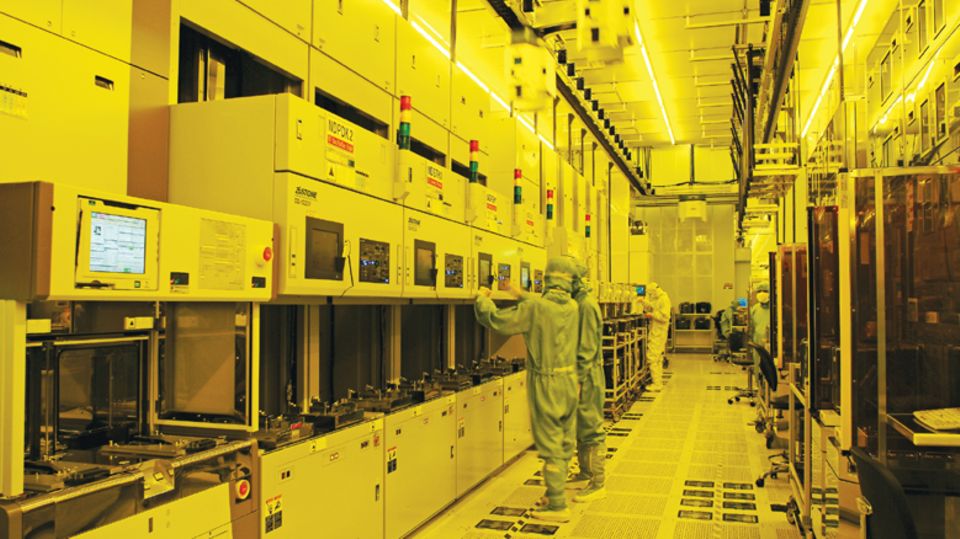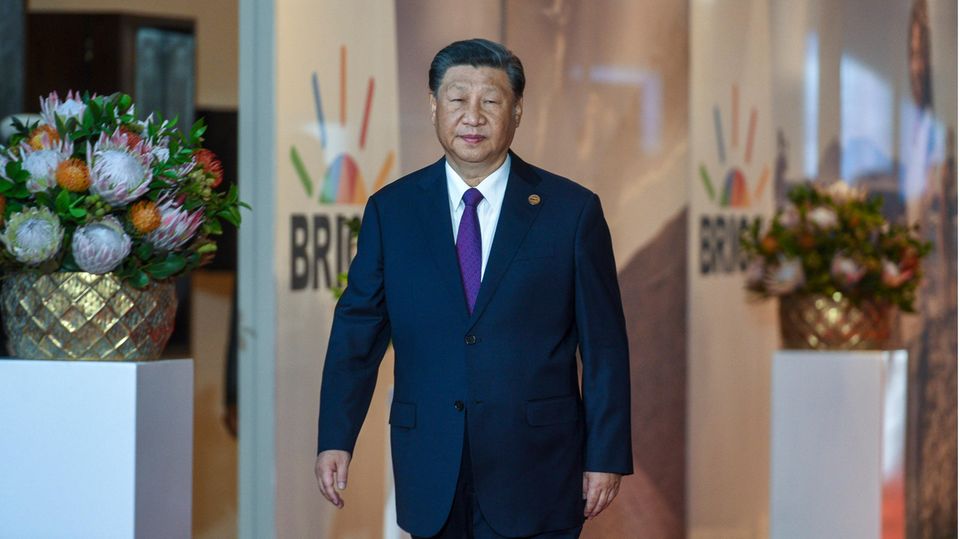analysis
Taiwan elections
Threatened by China: These candidates are fighting for the presidency in Taiwan
Taiwan’s current vice president William Lai is the leading candidate of the ruling DPP party.
© Sam Yeh / AFP
William Lai of the ruling DPP has a good chance of becoming Taiwan’s next president. There are lines of conflict domestically, but the country is united towards China. What you should know about the election on Saturday.
William Lai: The President-to-be Democratic Progressive Party presidential candidate William Lai cheers during a campaign rally. © Chiang Ying-ying / DPA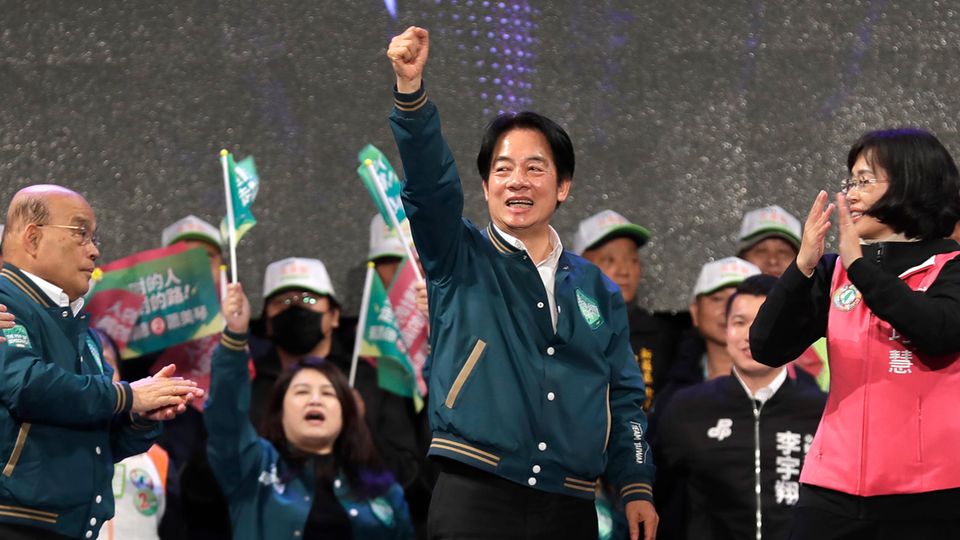
The current vice president and DPP party leader Lai has been a defining figure in Taiwanese politics for several decades. He began his political career as a member of parliament and later became mayor of Tainan City. He was most recently prime minister under incumbent President Tsai Ing-wen, who is no longer able to run after eight years in office. However, Lai wants to continue Tsai Ing-wen’s foreign policy line. He is open to talks with the Chinese leadership under President Xi Jinping, but at the same time would like to work more intensively with the governments of democratic countries, especially the USA, and also invest more in defense. Quote Lai: “We strive for peace and we trust in strength, not in the favor of the aggressor.”
Hou Yu-ih: The China-Friendly One Final spurt in the election campaign: Hou Yu-ih (M.) from the largest opposition party Kuomintang (KMT) shakes hands at a fish market in Kaohsiung. © Yasuyoshi Chiba / AFP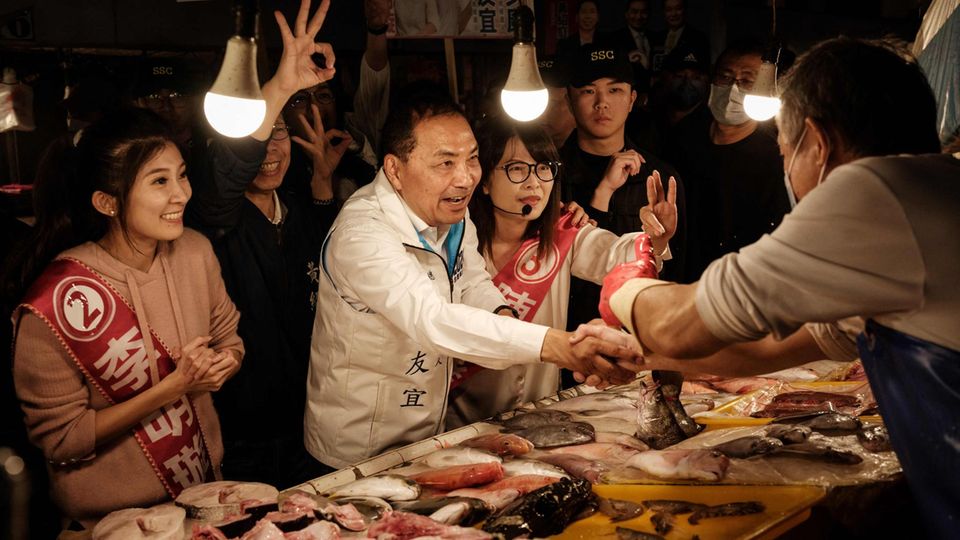
The KMT advocates greater political and economic rapprochement China one. But unlike previous elections, she also believes military deterrence against China is necessary. Their presidential candidate, Hou Yu-ih, was formerly the director of Taiwan’s top police department and is currently mayor of New Taipei, the country’s largest city. Hou accuses the DPP of provoking China and thereby increasing the risk of war. Quoting Hou: “Under the DPP, relations with China have deteriorated to such an extent that our children are no longer safe.”
Ko Wen-je: The new addition Taiwan People’s Party (TPP) presidential candidate Ko Wen-je arrives at a temple to pray for his success as part of his election campaign. © Ng Han Guan / DPA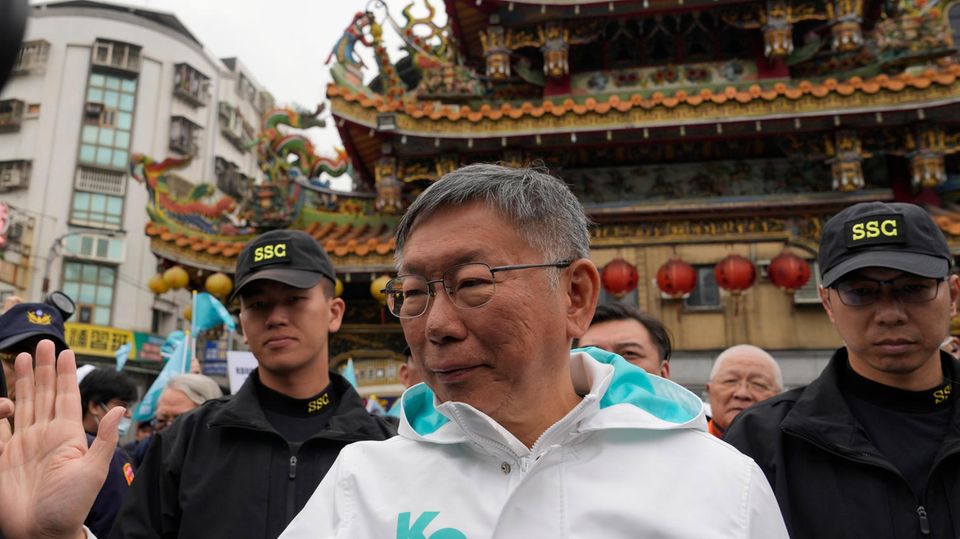
The TPP was only founded in 2019 and is fielding a presidential candidate for the first time. Ko Wen-je, former mayor of Taiwan’s capital Taipei, is looking for a middle ground between the foreign policy courses of the two major parties. He also plans to increase the defense budget, but wants to seek dialogue more than the DPP. During the election campaign, Ko is primarily focusing on social problems within Taiwan, such as rising real estate prices and stagnating wages. His rhetoric sometimes has something populist about it. He accuses his competitors of ignoring the problems in the country through their ideological disputes on the China question. This particularly appeals to young people and protest voters.
And who will it be now?
DPP candidate William Lai led in the last polls with almost 40 percent approval. As the most promising opposition candidate, Hou Yu-ih was around five to ten percent behind Lai and just ahead of Ko Wen-je. In Taiwan’s relative majority electoral system, the candidate with the most votes wins in just one round of voting. William Lai has the best chance of becoming the new president, but has significantly less popular support than his predecessor Tsai Ing-wen.
The DPP also risks losing its absolute majority in the parliamentary elections taking place at the same time. Parliament decides, among other things, on budgetary issues, which is why the opposition with more seats could block important government projects, for example in defense policy.
Nathan Batto, who has researched elections in Taiwan for more than three decades at National Chengchi University in Taipei, identified “a feeling of weariness and a desire for change” among the population after eight years with the DPP in power primarily from the stagnating economic situation. Many people are worried about the increasingly serious threat from China, but are equally tired about it. Nevertheless, there is an overwhelming consensus “that Taiwan does not want to be part of the People’s Republic of China, that Taiwan wants to maintain its democratic system and independent status.”
Distance to China, yes – but how far?
Batto attributes the biggest conflict in Taiwan’s politics to a split in national identity. The cultural and political ties with China are a constant in Taiwan’s history, but so is the preservation of an independent Taiwanese identity. The majority of the population is descended from southern Chinese settlers who came to Taiwan more than 300 years ago. The Kuomintang, translated as “National People’s Party of China”, only fled to Taiwan after their defeat in the Chinese Civil War. During a decades-long military dictatorship, she tried to shape the population as Chinese, both culturally and politically. The DPP only emerged from the resistance movement against KMT rule in the course of democratization in the late 1980s.
According to Batto, this historical background shapes the dispute between the two major parties to this day: “The question is: Who are we? About 60 to 65 percent of people now say: ‘We are not Chinese, we are Taiwanese.'” That the The KMT’s political positioning is more pro-China, which is also due to the fact that many of its supporters still feel that they belong to China culturally. The DPP, on the other hand, stands for greater self-determination for Taiwan. If not for the massive aggression and threatening gestures of the People’s Republic, the foreign policy orientations of the two parties would probably never have converged.
For weeks, China has been trying to influence the elections in Taiwan with a disinformation campaign and is exerting military and economic pressure on the island. The leadership in Beijing particularly insults William Lai and the entire DPP as separatists. If Lai wins, expert Nathan Batto expects China to “continue to not communicate with Taiwan in any official form” and continue to threaten the country. If one of the two opposition candidates becomes president, China’s pressure on Taiwan could be reduced somewhat in the short term. However, Batto assumes that the outcome of the election plays only a minor role in the Chinese leadership’s calculations, as all parties in Taiwan oppose the aggression by the giant.
China wants to bring Taiwan under its political control and has not ruled out using military force to achieve this. Since its founding in 1949, the People’s Republic has never ruled Taiwan. Most recently, Xi Jinping declared in his New Year’s address: “The reunification of the motherland is historically inevitable.” You can’t threaten more blatantly than that.


